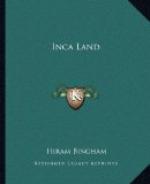The best unit-food-box provides a balanced ration for two men for eight days, breakfast and supper being hearty, cooked meals, and luncheon light and uncooked. It was not intended that the men should depend entirely on the food-boxes, but should vary their diet as much as possible with whatever the country afforded, which in southern Peru frequently means potatoes, corn, eggs, mutton, and bread. Nevertheless each box contained sliced bacon, tinned corned beef, roast beef, chicken, salmon, crushed oats, milk, cheese, coffee, sugar, rice, army bread, salt, sweet chocolates, assorted jams, pickles, and dried fruits and vegetables. By seeing that the jam, dried fruits, soups, and dried vegetables were well assorted, a sufficient variety was procured without destroying the balanced character of the ration. On account of the great difficulty of transportation in the southern Andes we had to eliminate foods that contained a large amount of water, like French peas, baked beans, and canned fruits, however delicious and desirable they might be. In addition to food, we found it desirable to include in each box a cake of laundry soap, two yards of dish toweling, and three empty cotton-cloth bags, to be used for carrying lunches and collecting specimens. The most highly appreciated article of food in our boxes was the rolled oats, a dish which on account of its being already partially cooked was easily prepared at high elevations, where rice cannot be properly boiled. It was difficult to satisfy the members of the Expedition by providing the right amount of sugar. At the beginning of the field season the allowance—one third of a pound per day per man—seemed excessive, and I was criticized for having overloaded the boxes. After a month in the field the allowance proved to be too small and had to be supplemented.
Many people seem to think that it is one of the duties of an explorer to “rough it,” and to “trust to luck” for his food. I had found on my first two expeditions, in Venezuela and Colombia and across South America, that the result of being obliged to subsist on irregular and haphazard rations was most unsatisfactory. While “roughing it” is far more enticing to the inexperienced and indiscreet explorer, I learned in Peru that the humdrum expedient of carefully preparing, months in advance, a comprehensive bill of fare sufficiently varied, wholesome, and well-balanced, is “the better part of valor,” The truth is that providing an abundance of appetizing food adds very greatly to the effectiveness of a party. To be sure, it may mean trouble and expense for one’s transportation department, and some of the younger men may feel that their reputations as explorers are likely to be damaged if it is known that strawberry jam, sweet chocolate and pickles are frequently found on their menu! Nevertheless, experience has shown that the results of “trusting to luck” and “living as the natives do” means not only loss of efficiency in the day’s work, but also lessened powers of observation and diminished enthusiasm for the drudgery of scientific exploration. Exciting things are always easy to do, no matter how you are living, but frequently they produce less important results than tasks which depend upon daily drudgery; and daily drudgery depends upon a regular supply of wholesome food.




